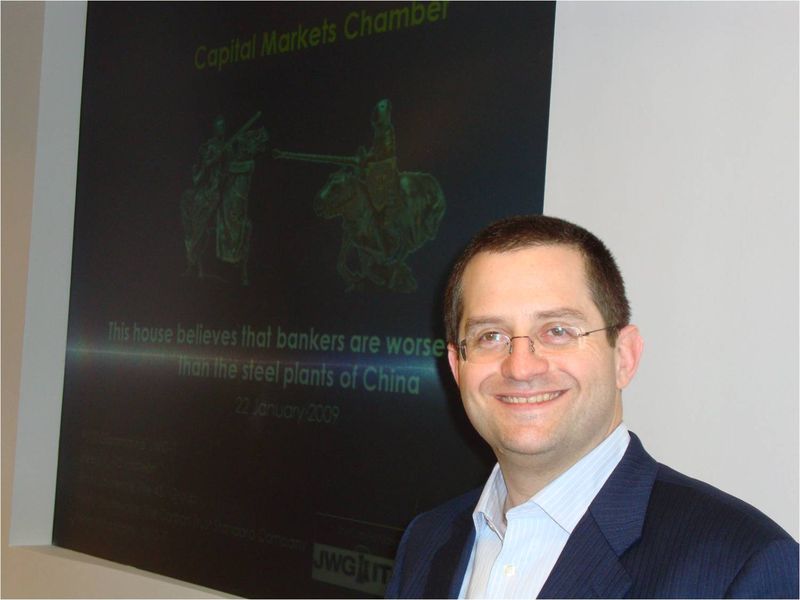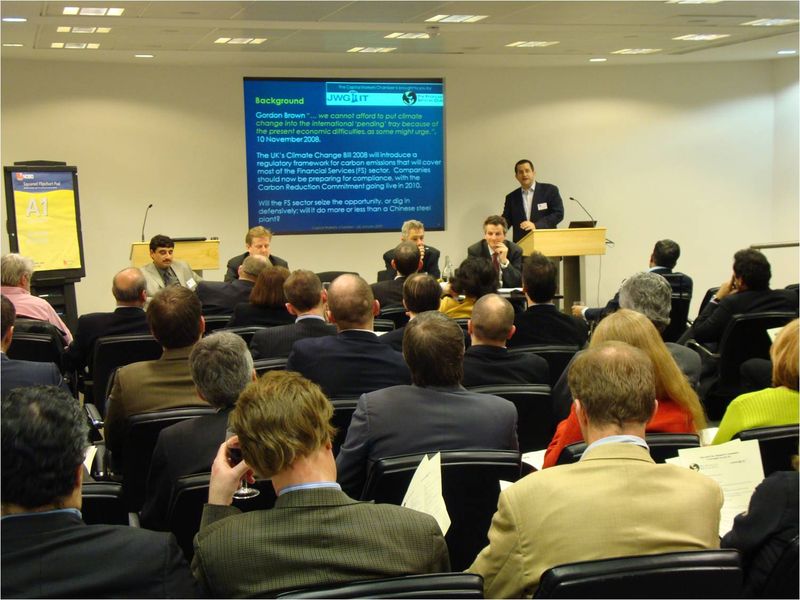
We had a fun evening at the FSClub last night, debating whether bankers were more polluting than the steel plants of China. How polluting are the steel plants of China you might ask? Not as much as cows although, according to an issue of Science magazine last year, if Chinese steel plants continue as they are unabated then they will clog up this planet with more greenhouse emissions by 2030 than the whole of Earth produces today.
Wow … serious schimola (?).
Conscious of the subject matter, I drove to the meeting in my normal city car and parked up.

I far prefer this car for short journeys than my stretched limo which only really works on long straight roads, so that’s the one I use for motorway driving.
The meeting was chaired by my mate PJ Di Giammarino, CEO of JWG-IT:

who steered the four panellists through the minefield of green issues.
In the green corner were Sreeni V of ITC Infotech and Peter Windebank of JWG-IT; in the opposite corner were Andy Lawrence from research firm The 451 Group, and Henry Garthwaite of The Carbon Trust Standard Company.
We then had an interesting conversation about tech and emissions with around fifty folks in the room:

The green guys were saying things like the new President Barack Obama’s first action was to put $150 billion into renewable energy and that the risk of pollution for bankers was the risk of taking no action at all. The green guys gave banks about 4 out of 10 and said they could do a lot better. And they said that it was not just a matter of internal emissions, but also the way banks funded their customers and commerce. For example, do they scrutinise investments by clients in things like sustainable construction?
In reply, the pro-banker community stated that every bank now has a strategy for energy efficiency and are far better than other sectors in their use and management of technology and energy overall., The fact that energy comprised only 0.02% of all costs for the banks demonstrates this, with 34% of that 0.02% comprised of emissions from technology which was reducing dramatically every year.
We then got into the debate with a lot of discussion about the UK’s energy bill.
The UK’s Climate Change Bill 2008 will introduce a regulatory framework for carbon emissions that will cover most of the Financial Services sector, and the view is that companies should now be preparing for compliance with the Carbon Reduction Commitment (CRC) going live in 2010.
Will the finance sector seize the opportunity or dig in defensively? Will it do more or less than a Chinese steel plant?
The evening finished with a vote where about 60% of the audience voted "No", the banking sector is not as polluting as the Chinese steel plants.
I then interjected and wondered what the Chinese steel industry had ever done to offend this London based audience.
Get real, for if the costs are only 0.02% of total bank costs, then who cares? Not the banks' board. If the bank or the banks’ customers can make a buck out of polluting the
planet, then who cares? Banks are here to make money (or at least they used to be). And if it’s green investments versus still being able to operate tomorrow and survive, I know
which route I would take. Banks don’t care about green. They care about costs. If I am about to go out of business, then I don’t care about green. I care about survival.
We all want to be ethical and nice but, as a financial industry it is far more important to make money than to be ethical or nice. If we were all ethical and nice, then arms dealers and the weapons industry wouldn’t exist and banks would not provide services to those industries.

Nope, it’s all complete baloney.
I was reminded of a debate that Michael Mainelli and I had last year on green issues, where Dr. Mainelli demonstrated that we could make money out of being green:
How to Make Money out of Being Green
Dr. Michael Mainelli addressed the Financial Services Club on the subject of: “How to Make Money out of Being Green”.
The presentation was based upon the London Accord, a programme that has been driven by Dr. Mainelli and his company Z/Yen who are sponsors, alongside the City of London
Corporation, BP, the Climate Conservancy, Forum for the Future and Gresham College, where Michael is also serving as Professor of Commerce.
Michael began his presentation by talking about the roots of the London Accord, which goes back to 2002 when the City of London Corporation launched the London Principles Project.
The London Principles Project was commissioned by the City of London as a result of the Forum for the Future’s “Centre for Sustainable Investment”. This Centre examines the role of the UK
financial services sector in promoting sustainable development and came up with a whole range of best practices and lessons.
The result was the publication of Seven Principles:
1. Provide access to finance and risk management products for investment, innovation and the most efficient use of existing assets
2. Promote transparency and high standards of corporate governance in themselves and in the activities being financed
3. Reflect the cost of environmental and social risks in the pricing of financial and risk management products
4. Exercise equity ownership to promote efficient and sustainable asset use and risk management
5. Provide access to finance for the development of environmentally beneficial technologies
6. Exercise equity ownership to promote high standards of corporate social responsibility by the activities being financed
7. Provide access to market finance and risk management products to businesses in disadvantaged communities and developing economies.
The result of these principles is that the City took notice of sustainability, corporate social responsibility, environmental and green investing, and other ethical programmes to protect the future of the planet. However, identifying that the planet has problems with sustainability and actually doing anything about it, are very different matters. For example, the Center on International Cooperation & River Path Associates published a report in December 2007 entitled: “The State of the Debate”. In this report, they made clear that “while climate change may have reached a tipping-point of sorts in 2006, as far as perceptions of the problem are concerned, the same cannot be said for perceptions of the solution.”
The conclusions of the London Principles Project were that:
a) private sector investments are critical if sustainability is to occur, as public sector spending cannot work alone;
b) this is because the private sector invest in a broad portfolio of risk, with the aim of having at least one success, whilst public sector tend to investigate a portfolio of risk and the invest in just one area for success – the latter is never as successful as the former;
c) a public/private partnership is required for such programmes to succeed;
And so a tipping point of sorts did occur in 2007, when the London Accord was created.
The Accord aimed to show investors and policy-makers where and how to make investment work for the climate, by applying financial analysis to climate change investments.
For example, carbon emissions cost around €30 per tonne but economists can show that the average voided carbon emission per tonne can be valued conservatively at around
€1000 or more per year, rather than €30. Equally, another way of looking at this, is to think about the fact that the average British person generates around 10 tonnes of carbon dioxide per year. Governmental targets are to reduce that level of carbon to 1 tonne or less. In other words, 9 tonnes less by €30 per tonne is worth €270 per year for each person in Britain. That’s a €16.2 billion market. Just in Britain alone.
It was this realisation that made the London Accord become something that could attract banks and insurers to take environmental investments more seriously, with a wide range of investment firms joining in the programme of research. These firms included ABN AMRO, Bank Sarasin, Barclays, Canaccord Adams, Cheuvreux, Crédit Agricole, Credit Suisse, JP Morgan Chase & Co, Merrill Lynch, Morgan Stanley, Société Générale and WestLB.
Each firm invested around £500,000 to join the Accord and so, between them, these firms invested £7 million ($14 million) during 2007 to research sustainable investing. The result has been the production of over 780 pages of ground-breaking ‘open source’ research, produced by over 400 people, all publicly available through the Accord’s website.
The outputs include 24 reports covering the principles and outline of why sustainable investments are important; a range of investment opportunites from solar energy through emissions trading; analysis of the legal, fiscal and other areas related to sustainable investing; and commentary papers on the role of philanthropy through to taxation and trading implications.
The research was made available publicly at a meeting in the Mansion House, London, on 19th December 2007. Around 300 people gathered for a meeting to release the results of the London Accord, hosted by the Lord Mayor of London.
The real outcome of these investigations is that capital-based trading schemes provide market-driven solutions that identify efficient sets of solutions. For example, through capital-based trading, carbons can be treated just the same, for investment purposes, as any other form of commodity, such as oil, iron and copper. As carbon trading markets grow and prosper, it also means that firms will find that they can make money out of these investments. For example, if a tonne of carbon emissions are valued at €30 today, what will their price be tomorrow as governments spend more and more time investment and legislating in this area of economic activity? Michael suggested that €270 a tonne may not be unreasonable within the next ten years, especially as government realize that we have 7 gigatons of emission today, rising to 14 gigatons by 2050 if current trends continue.
However, firms will not make a killing through sustainable investments immediately, and Micahels’ other message is to be realistic. For example:
“Given [the] obstacles, along with the fact that some key technological aspects remain unproven, Carbon Capture and Sequestration (CCS) is unlikely to contribute to stabilizing atmospheric concentrations of CO2 over the next two decades.” JP Morgan, The London Accord
“Photovoltaic [should grow at a] rate of 50% over the period 2006-2010. For the next decade (2011-2020) average annual growth is expected to run at well over 22%." Bank Sarasin, The London Accord
“Since the price of diesel is highly correlated with the price of crude oil, high oil prices imply higher biodiesel prices, in our view. Therefore, if oil prices remain high – ie, greater than US$55/barrel, there is potential for significant upside in the valuation of biodiesel.” ABN Amro, The London Accord
“Climate changes are locked into the world’s weather system and these changes may represent material risks (or opportunities) to business.” Barclays & Acclimatise, The London Accord
“The renewable energy industry has momentum and is here to stay. [...] Several technologies are already price competitive and others are close, when GHG emissions are priced in. [...] Our top picks are in: project developers, geothermal, solar thermal and wave power.” CanAccord Adams, The London Accord
“Reducing the percentage of energy costs in relation to total sales has become a key means of remaining competitive and lessening the impact of higher raw material costs on profit.” Credit Suisse, The London Accord
At the end of his presentation, I asked Michael whether the fact that banks were already focusing upon sustainability, such as those banks who had won the Financial Times Sustainable Bank Awards, meant that banks were already very aware of these opportunities already?
Dr. Mainelli’s response was interesting.
“You could run the world’s filthiest bank and still make up for it through sustainable investments”, he said.
In other words, for all the platitudes and awards ceremonies on earth, nothing will make more difference than realising you can make money out of
encouraging, managing and making sustainable investments through capital and trading across the world’s commodities markets. Saving a penny here and there through using email and videoconferencing, rather than paper and travel, is nice … but it just won’t cut-it.
About Dr. Michael Mainelli
Dr. Mainelli is Executive Chairman of Z/Yen, a City-based risk/reward firm, where he works
on strategy, technology, finance and business development. His early research
was in aerospace and computer graphics, which led to work in seismology,
cartography and energy information.
He spent seven years as a partner and board member of an accountancy firm directing
their financial services consultancy work in the UK and overseas, followed by a
position as Corporate Development Director of the MoD’s Defence Evaluation and
Research Agency. From November 1995 to July 1997 Dr. Mainelli was Chief
Scientist of the Financial Laboratory, a DTI project undertaking research into
the visualisation of financial risk.
In August 2005, Dr. Mainelli was appointed by the Council of Gresham College as The
Mercers’ School Memorial Professor of Commerce at the College. Gresham College is an independent educational
institution, governed by a Council with the Lord Mayor of London as its
President.
Dr. Mainelli is a qualified accountant, computer specialist and management consultant with a
degree from Harvard in government with economics, plus a further year of
mathematics and engineering at Trinity College Dublin and a PhD from the London
School of Economics and Political Science, University of London.
Chris M Skinner
Chris Skinner is best known as an independent commentator on the financial markets through his blog, TheFinanser.com, as author of the bestselling book Digital Bank, and Chair of the European networking forum the Financial Services Club. He has been voted one of the most influential people in banking by The Financial Brand (as well as one of the best blogs), a FinTech Titan (Next Bank), one of the Fintech Leaders you need to follow (City AM, Deluxe and Jax Finance), as well as one of the Top 40 most influential people in financial technology by the Wall Street Journal's Financial News. To learn more click here...

